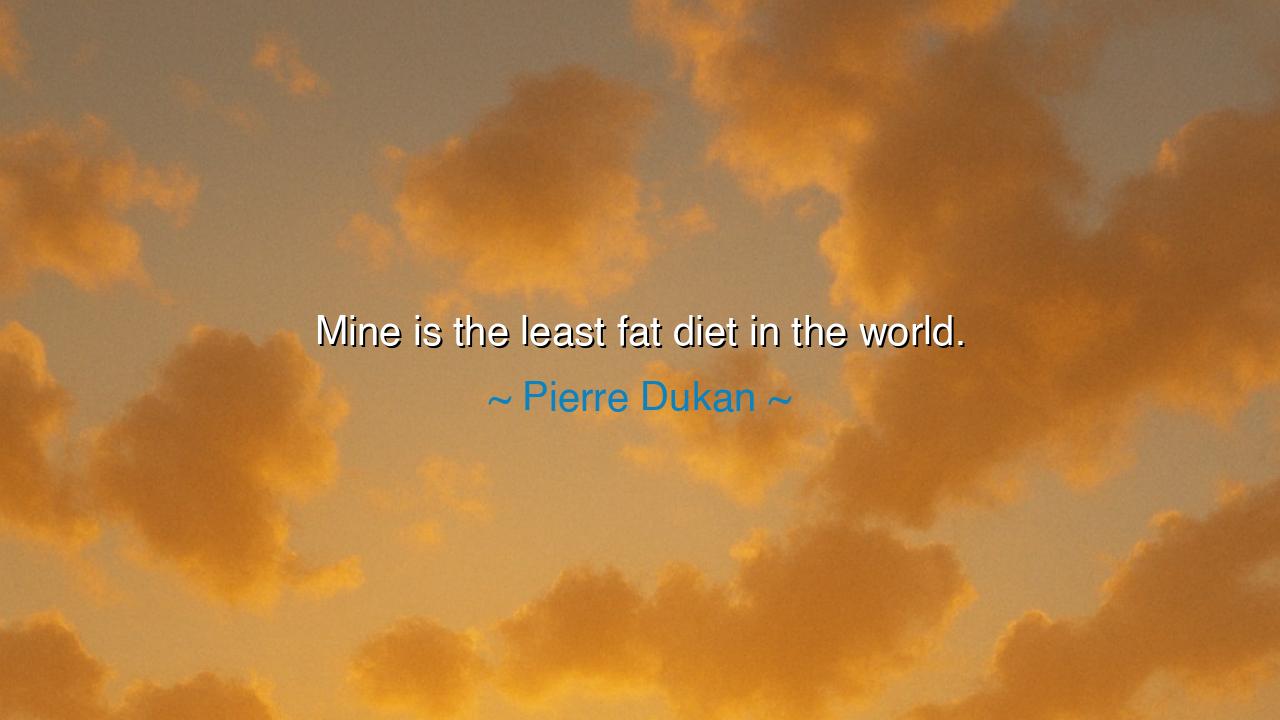
Mine is the least fat diet in the world.






When Pierre Dukan proclaimed, “Mine is the least fat diet in the world,” he spoke not merely as a physician of the body, but as a philosopher of restraint. His words are a declaration of purity, of discipline, of mankind’s eternal struggle to master desire and restore harmony between appetite and purpose. In this statement, one hears both pride and prophecy — pride in having crafted a method of health, and prophecy in warning a world that has long surrendered to excess. The phrase is not about fat alone; it is about the burden of indulgence that clings to modern life, the weight not only upon our bodies but upon our spirits.
The ancients would have understood this cry well. For in every age, humanity has wrestled with abundance — and the danger it brings. When the people of Rome grew wealthy and idle, their banquets became their downfall. The tables that once bore bread and fruit began to groan under the weight of roasted beasts and overflowing goblets of wine. The historian Sallust wrote that as luxury increased, virtue decreased. It was not the enemies at their gates who destroyed them, but the indulgence in their hearts. In his vow to create the “least fat diet,” Dukan echoes the wisdom of those who have seen civilizations falter under the seduction of excess. He seeks a return to balance, to the lean and noble simplicity that once defined strength.
Yet his words also hold compassion. The Dukan Diet, known for its low fat and high protein principles, is not merely a regimen of deprivation but a path toward renewal. To reduce fat, in his sense, is to strip away not only what burdens the body but also what clouds the will. He asks us to remember that food, like life, is best when refined — not by flavor alone, but by intention. For the greatest feasts of the soul are not those that overflow, but those that satisfy without excess. The ancient Spartans, who lived on simple fare and water, built bodies of steel and hearts of discipline. In their leanness was their power; in their restraint, their glory.
Consider the story of Mahatma Gandhi, who, though not a warrior of the sword, waged his battle through self-mastery. He lived on fruits, grains, and little else, believing that to govern the body is to free the mind. He once said, “The control of the palate is the first essential in the life of a man who would lead others.” His strength did not lie in muscle or armor, but in purity — a purity not unlike that which Dukan extols. To embrace a least fat diet is to embrace clarity, to shed what is unnecessary until only essence remains.
But Dukan’s words are not meant to glorify austerity for its own sake. They are a reminder that health is born of harmony. Fat, in the symbolic sense, represents all that weighs us down — not only in flesh, but in thought and habit. The modern soul is bloated with distractions, cravings, and artificial pleasures. The least fat diet is not merely nutritional; it is philosophical. It calls us to remove from our lives the processed and the false, to consume what is real, honest, and alive. It is an invitation to cleanse the self, to seek simplicity in a world drowning in excess.
And yet, there is tenderness in this teaching. For to live simply is not to live joylessly. The monk who eats one bowl of rice does not hunger for more; he finds peace in that sufficiency. Likewise, the man or woman who eats with mindfulness — who listens to the body’s quiet voice rather than the world’s loud temptation — rediscovers the lost art of gratitude. Dukan’s statement, austere as it sounds, is not a denial of pleasure but a refinement of it. True pleasure is not found in abundance, but in appreciation.
Let this be the lesson passed down to the generations: Seek not the fullness that numbs, but the leanness that awakens. Whether in food, in thought, or in desire, remove what is unnecessary so that your spirit may breathe. Be like the craftsman who chisels away marble until the statue within is revealed. Make your life a least fat life — pure in habit, clear in purpose, and light enough to move toward greatness.
And so, as the ancients taught and Dukan reminds us, moderation is not weakness — it is strength harnessed. To live lightly is to live freely. To eat cleanly is to think clearly. Let your choices nourish not only your body but your spirit. For when you cast off the weight of indulgence, you do not lose — you ascend.






AAdministratorAdministrator
Welcome, honored guests. Please leave a comment, we will respond soon